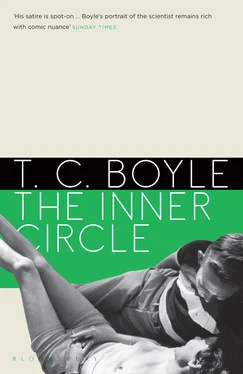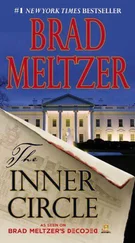I’d been filling out catalogue cards for the new arrivals when she came up to the desk and took me by surprise. Before I could even think to smile, a hand went to my hair, smoothing it down where the rebellious curl was forever dangling. “I’d be — sure,” I said. “I’m not really — it’s the librarian you want, Mr. Elster, but I could — I’ll do my best, certainly.” And then I found my smile. “For you, of course.”
Her voice went soft. “I wouldn’t want to be any trouble — I’m sure you have better things to do. But if you could just point me in the right direction—”
I got to my feet and shot a glance across the room to where Elster sat at his own desk, partly obscured by a varnished deal partition. He was a short, thin, embittered little man, not yet out of his twenties, and, as he was quick to remind me, it wasn’t my job to take queries or assist the patrons — that was his function, and he guarded it jealously. For the moment, however, he seemed oblivious, absorbed in paperwork — or one of the crossword puzzles he was forever fussing over. When I responded, my voice was soft too — this was a library, after all, and there was no reason to draw attention to ourselves. “Current issues of the journals are alphabetized along the back wall, but what you’ll want are the indexes, and they’re — well, why don’t I just get them for you?”
She was smiling up at me as if I’d already found the relevant citations, written them up for her and submitted the paper all on my own, and her eyes twitched and roved over my face in a way we would later identify as one of the subliminal signals of availability (readiness to engage in sexual activities, that is, in kissing, petting, genital manipulation and coitus), though at the time I could only think I must have something caught between my teeth or that my hair needed another dose of Wildroot. “Have you heard from your mother?” she asked, abruptly changing the subject.
“Yes,” I said. “Or, no. I mean, why do you ask, has something—?”
“Oh, no, no,” she said, “no. I just wanted to know how she was doing, because I never did get to thank her for that lovely afternoon and her hospitality. And yours. We had a really memorable time, Tommy and I.”
“They were terrific cookies,” I said stupidly. “My grandmother’s recipe, actually. They’re a family tradition.”
For a moment I thought she wasn’t going to respond and I stood there self-consciously at the desk, fumbling in my mind for the key to the next level of small talk — her mother, shouldn’t I ask about her mother, though I barely knew her? — but then she said something so softly I didn’t quite catch it.
“What?”
“They were, I said.” I must have looked puzzled, because she added, “The cookies. I was agreeing with you.”
I floundered over this for a minute — as I told you, I wasn’t much with regard to small talk, not unless I had a couple of drinks in me, anyway — and then she let out a giggle and I joined her, my eyes flicking nervously to Elster’s desk and back. “Well,” I said finally, “why don’t you find a seat and I’ll, well — the indexes …”
She settled herself at one of the big yellow-oak tables, laying out her purse, her book bag, her gloves, coat and hat as if they were on display at a rummage sale, and I brought her the journal indexes that might have been most promising, then retreated to my work at the main desk. The room was warm — overheated, actually — and smelled, as most libraries do, of dust and floor wax and the furtive bodily odors of the patrons. A shaft of winter sunlight colored the wall behind her. It was very still. I tried to focus on what I was doing, writing out the entries in my neatest block printing, but I kept looking up at her, amazed at the vitality she brought to that sterile atmosphere. She was wearing a long skirt, dark stockings, a tight wool sweater that showed off her contours and complemented her eyes, and I watched her head dip and rise over her work — first the journal, then her notebook, and back again — as if she were some exotic wild creature dipping water from a stream in a pastoral tale.
But she wasn’t wild, not at all — she was as domestic as they come. And, as she later admitted, she’d brought herself to the library that day for the express purpose of reminding me that she was still alive and viable, that she had lips that could be kissed and hands that yearned to be held. In truth, she’d already written up her notes on the nasty little parasites that cause malaria — already had everything she needed — and was there at the desk with her hair shining and her head dipping and rising for my delectation alone. She had, as my mother knew long before I did, set her cap for me, and she was determined to allow me to discover that fact in my own groping way. Before she went home we had another little chat and I’d somehow managed to ask her out for Saturday evening to attend a student production of a popular Broadway play.
The other thing that happened involved Prok, and I suppose it was emblematic of all that was to unfold between us — that is, between Prok and me on the one hand, and me and Iris on the other. It was the same week Iris had come to the library — perhaps even the same day; I can’t really remember now. I was just leaving work when I heard someone call out my name and turned to see Prok coming down the steps at the front of the building. “Milk, hold up a minute, will you?” he called, and then he was at my side, peeling off one glove to take my hand in his. “So how is it, then? The new position suitable?”
“Yes,” I said, “I’m very much — it’s interesting.” My words hung in the air as if no one had spoken them. I felt for my cigarettes inside my jacket pocket, then realized I must have left them back at my desk.
“But let’s walk,” he said. “You going my way?”
“I live over on Kirkwood.”
“Ah. Well. Wrong direction, then. But indulge me — a young fellow like you ought to be able to stand a two-block detour I would expect, no?”
And then we were walking — in the direction of his house on First Street — the campus trees arrayed around us like statuary, lights riding high in the windows of the big pale buildings under a darkening sky. The air was tense with the cold, stretched thin over the skin of the evening, but it felt good to be out in it after the confinement of the library. There were patches of ice in the street. Trashcans stood at the curb. Prok was just slightly ahead of me, chopping along in his usual two-for-one stride (for Prok everything was competitive, even walking) and speaking over his shoulder so that his words came to me wrapped in an envelope of frozen carbon dioxide.
“I was just remarking to Clara what an interesting person you are and how much you impressed me, and she said, ‘Well, why not have him over for dinner, then?’ and I thought that would be just fine because I expect you don’t get all that much home cooking, do you? You know, as we were saying the other week, the mother’s touch?”
“No,” I said, “you’re absolutely right. It’s either the Commons or the diner, I’m afraid.” I was aglow with the compliment— I’d impressed him —and the words came easily.
“Plenty of grease and gristle to fuel those expanding brain cells.” He’d swung his big head round to smile at me.
“And of course we’re not allowed to cook for ourselves—”
“Rooming house, eh?”
I nodded. We were on one of the side streets now, across from the university. There was very little traffic.
“Well,” he said, pulling up short and swinging round on me, “so how about it? Shall we say Saturday, six p.m.?”
I must have hesitated, because he added, in a different tone altogether, almost as if he were preparing to build a case, “If you’re not doing anything, of course. You don’t have any plans, do you? For Saturday?”
Читать дальше












